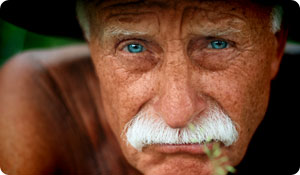
The dog days of summer are officially here. And while steamy hot days can be difficult for anyone to endure, very warm temperatures pose particular dangers to the elderly. For senior citizens, it's important to take special precautions when temperatures soar past the point of comfort.
Why are the elderly are so at risk when temperatures are high? Older people don't adjust as well as younger people to sudden temperature swings. They may have chronic medical conditions that affect how their bodies respond to heat, and they may be on medications that make their bodies less responsive to heat and less able to cool themselves down. Also, many older people live on limited incomes and lack air conditioning. It may be hard for them to get to places with air conditioning, such as malls, cars, and community cooling centers.
When an older person gets overheated, he or she may develop heat exhaustion. The symptoms may include sweating excessively, feeling tired, weak, and dizzy, having a headache, feeling nauseated, having a fast, weak pulse, and breathing quickly and shallowly. More serious is heat stroke, which can cause the body's temperature to rise past 106 degrees within 10 to 15 minutes. With heat stroke, the victim is not sweating at all, has a fast, strong pulse, a throbbing headache, and feels dizzy and nauseous. Heat stroke can kill or cause permanent disability if the person is not cooled down immediately, either by getting into the shade or air conditioning or being immersed in cool water.
How can you prevent heat-related illness from occurring in the elderly in the first place? Here are some tips from the Centers for Disease Control & Prevention:
- Keep hydrated. Drink plenty of cool beverages that don't contain alcohol. Watch out for extremely cold drinks, as they can cause cramps.
- Rest. This is not the day for gardening or a brisk walk.
- Remain inside. Don't tempt fate by exposing yourself to the elements.
- Stay moist. Take cool baths or showers, or keep a cool washcloth nearby.
- Don't overdress. Lightweight clothing is key.
Source: Centers for Disease Control, www.bt.cdc.gov.





